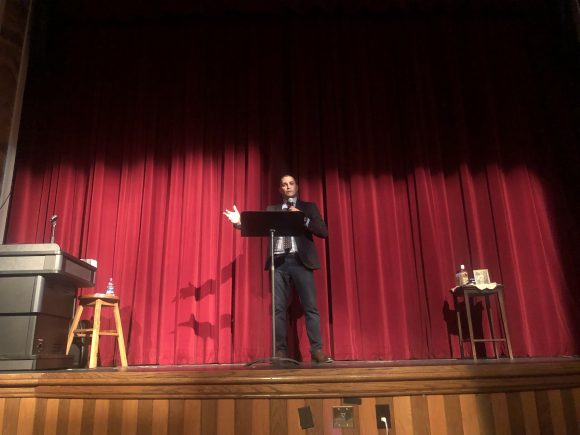
Javier Ávila speaks to an audience at Old Main on Oct. 6, 2022. (Ann Marie Vanderveen/CU Independent)
Javier Ávila, in his one-man show entitled “The Trouble with My Name”, examined the complexities of racial and ethnic identity and how their definitions changed for him throughout his move from Puerto Rico to Pennsylvania in Old Main Chapel on Thursday, Oct. 6.
“I did not know what it was like to be a minority for the first 30 years of my life,” he said to the audience.
Ávila, an English professor at Northampton Community College, describes his performance as the “perspective of American Latinos who struggle to dispel misconceptions about their identity and place in the world.”
The event was organized by CU Boulder’s Arts and Sciences Office for Justice, Equity, Diversity, and Inclusion as well as the Latin American Studies Center in honor of National Hispanic Heritage Month. Ávila has been touring with this performance nationally since 2016.
The show is presented through a blend of poetry and comedy. Ávila said that he is both a “proud American and Puerto Rican,” a blend of cultures he said defines him as “the American of the future.” That’s what Ávila’s show presents: A man of two parts, two places, two languages and two cultures.
“One thing will not take away from the other,” he said. “It will only add to it.”
Ávila was born and raised in Puerto Rico. He is a native Spanish speaker; however, many of his earlier classes were taught in English.
“So I spoke English at school, Spanish at home, and Spanglish everywhere else,” he said during the show.
The idea that his two identities are conflicting, which Ávila said he disagrees with, followed him in his move to the continental U.S. When he was younger, he said he had a distaste for how common his first name “Javier” was.
“I wanted a different name, an exotic name that reflected how artistic I was,” he said.
In one of his many anecdotes, Ávila described a fellow student from his school years who had what he thought was the “coolest name” at the time, a name virtually unheard of by the majority-Puerto Rican student body: Shaun Roberts.
However, Ávila said the tables turned on him when he arrived in the mainland United States.
“I got my wish,” he said. “I moved to Pennsylvania, and I started to become exotic.”
In “The Trouble with my Name,” a poem he read during his show of the same title, Ávila discussed the pronunciation and often the mispronunciation of his name.
“Ávila” became “Avila” since it is uncommon to use accent marks in English. This emphasizes the “I” rather than the “A.” One time, when a police officer pulled him over, Ávila recalled correcting the pronunciation of his last name. The cop reportedly said, “’that might be the way Spanish people say it, but this is America.’”
Ávila said he was frustrated at this frequent generalization and lack of acknowledgment of the Latin American community in the United States.
“America consists of dozens of countries, and, in most of them, se habla español,” he said.
For Ávila, however, the authentic pronunciation of his name is heard through a daily phone call.
“I dial the number, the only one I know by heart,” he said. “I hear my name the way it’s supposed to sound: in the voice of my mother.”
Throughout the entirety of the show, even before Ávila stepped on stage, he kept an intimate relationship with his audience. Before the show, he joked about a recent incident in which he said his son shuffled his notes to see if he really had his whole presentation memorized. Following his performance, he spoke to several audience members, giving one piece of advice on publishing poetry or another on how she should get people in her life to pronounce her name right.
Estefania Luna, one of the CU Boulder student audience members, commented on the show afterward saying, “It was very relatable from someone from a Hispanic background.”
Ávila expressed his belief in unity and multicultural pride. He said he is optimistic for America’s future when he sees the diversity in its citizens today. In the last line of his final poem, “Bloodline,” Ávila said to the audience, “When you see me, you’ll see yourself.”
Contact CU Independent Staff Writer Ann Marie Vanderveen at anva3588@colorado.edu.
